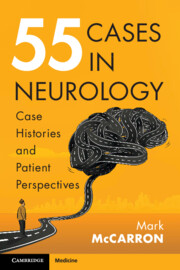Book contents
- 55 Cases in Neurology
- 55 Cases in Neurology
- Copyright page
- Contents
- Preface
- Acknowledgements
- Section 1 Visual Disturbance
- Section 2 Headache and Pain
- Section 3 Weakness
- Case 19 Bleeding Brain
- Case 20 A Battery Issue
- Case 21 Symptoms Took Years to Develop
- Case 22 High-Frequency Improvement
- Case 23 Singling Out Dermatomes
- Case 24 Asthmatic Neurology
- Case 25 Neurological Consequences of Infection
- Case 26 When Speech and Swallow Fail
- Case 27 Recurrent Weakness
- Case 28 Increasing Golfing Handicap
- Section 4 Behavioural and Language Changes
- Section 5 Confusion
- Section 6 Movement Disturbances
- Section 7 Acute Onset of Neurological Symptoms
- Index
- Plate Section (PDF Only)
- References
Case 26 - When Speech and Swallow Fail
from Section 3 - Weakness
Published online by Cambridge University Press: 27 July 2023
- 55 Cases in Neurology
- 55 Cases in Neurology
- Copyright page
- Contents
- Preface
- Acknowledgements
- Section 1 Visual Disturbance
- Section 2 Headache and Pain
- Section 3 Weakness
- Case 19 Bleeding Brain
- Case 20 A Battery Issue
- Case 21 Symptoms Took Years to Develop
- Case 22 High-Frequency Improvement
- Case 23 Singling Out Dermatomes
- Case 24 Asthmatic Neurology
- Case 25 Neurological Consequences of Infection
- Case 26 When Speech and Swallow Fail
- Case 27 Recurrent Weakness
- Case 28 Increasing Golfing Handicap
- Section 4 Behavioural and Language Changes
- Section 5 Confusion
- Section 6 Movement Disturbances
- Section 7 Acute Onset of Neurological Symptoms
- Index
- Plate Section (PDF Only)
- References
Summary
An 89-year-old left-handed man presented with a two-month history of difficulty swallowing after an operation for a left retinal detachment. He described choking. He had particular difficulty with crumbs. He had nasal regurgitation. A speech and language therapist confirmed problems with the pharyngeal phase of his swallowing, in that there was incomplete pharyngeal swallow, severe pharyngeal dysphagia and an aspiration risk. The patient had also noticed over the same two months that as he talked his speech became slurred. He had no breathing or walking difficulties and denied any diplopia, blackouts or dry mouth.
- Type
- Chapter
- Information
- 55 Cases in NeurologyCase Histories and Patient Perspectives, pp. 177 - 184Publisher: Cambridge University PressPrint publication year: 2023



